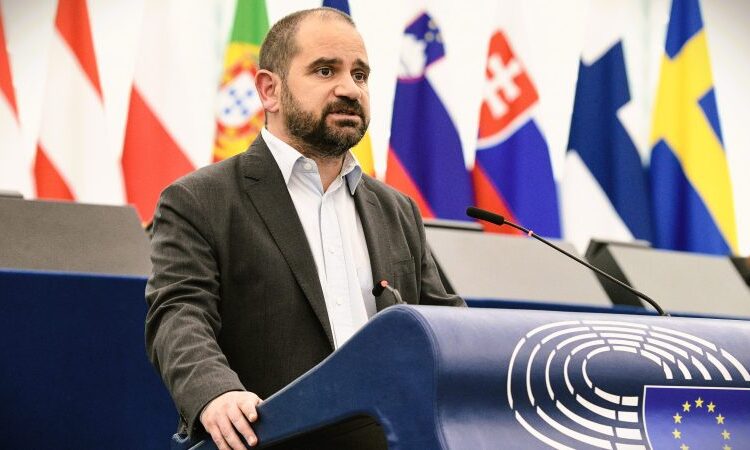
***The Europe Ahead series will cover views from MEPS in charge of economic files for the main political groups in the run-up to the June EU elections
The European Union should overcome its political resistance against government spending and adopt state-led industrial policies like the US and China to boost its faltering economy, Vice-Chair of the European Parliament’s Committee on Economic and Monetary Affairs José Gusmão told Euractiv.
The Portuguese MEP from the Left Group said Europe is showcasing continued loyalty to a free-market doctrine that Washington and Beijing have long renounced – which threatens to aggravate the bloc’s industrial decline, jeopardising climate transition goals, he argued.
“I think the big problem with the thinking of European institutions when it comes to industrial policy is that they believe the free market speech,” Gusmão said, “whereas, in the US, they know it’s just propaganda: it’s something that [they] recommend other countries to do, but they have never done it themselves.”
“Right now, the European Commission is busy complaining about what [the US and China] are doing when it comes to industrial policy instead of just doing the same,” he said, echoing recent calls by former European Central Bank’s (ECB) President Mario Draghi to shore up the bloc’s economic strategy in the face on ramped-up protectionist moves by the two other blocs.
Gusmão added the economic protectionism he sees being enacted by the US — typified by the federal government’s Inflation Reduction Act (IRA) passed in 2022 — will only be intensified if Donald Trump is re-elected as US president in November.
“If we have Trump in office, we’re going to have a proud protectionist in the White House,” he said.
“So the Inflation Reduction Act is going to look like heaven to us — and the business-as-usual policies of the European Union are going to look even worse.”
Tight monetary policy ‘a self-imposed restriction’
Gusmão dismissed the recent claim by top EU officials that the higher debt accrued by member states during the COVID-19 pandemic and subsequent energy crisis means that the bloc’s required industrial and green investments should be delivered primarily by the private sector.
Instead, he argued that the financing could be provided through monetary measures, namely by requiring the ECB to expand its money supply.
Pointing to the example of Japan, he said the country, while faced with its own economic challenges, has “no issue of funding”.
“Actually, the country doesn’t fund itself [through] taxes, and it doesn’t need to because it isn’t bound by economic orthodoxy,” he said.
Similarly, Gusmão said, “The US used money-printing massively during the pandemic, and they have been doing so for quite some time,” said the MEP, adding that the UK went down the same path.
“So, the issue of ‘there is no money’ is a self-imposed restriction by the European institutions,” he said.
Asked whether such policies might lead to a resurgence of inflation across the EU, Gusmão replied that there is no “necessary” connection between monetary expansion and high inflation.
He also noted that the massive quantitative easing programmes introduced by the ECB during the eurozone crisis a decade ago did not cause prices to soar.
‘Right now, we should be investing’
Gusmão also expressed support for altering the ECB’s mandate, which he described as “structurally inadequate for the economic needs of the European Union”, to allow inflation levels beyond their current 2% target.
“We view 5%, 6%, or 7% inflation rates as a catastrophe. There is no empirical historical evidence that that is the case,” he said.
“Right now, we should be investing to deal with some of our structural problems – […] if that means having 5% or 6% inflation, there’s no problem with that,” he added.
The MEP was also heavily critical of the ECB’s repeated interest rate hikes over the past two years, arguing they severely hampered investment and represented an inappropriate response to a price surge that “had nothing to do with the economy overheating”.
Gusmão further suggested that Europe’s economic woes will be compounded by the new fiscal rules agreed upon by the Parliament and member states in February, which he said will “put [Europe] back on the track of austerity policies”.
‘The far right tends to blame the other’
Gusmão’s comments come amid growing support across Europe for parties at the far ends of the political spectrum — a fact many analysts attribute at least partly to voters’ increasing economic anxiety.
According to Euractiv’s latest projections, the Left Group is expected to gain seven seats following the June elections, while the hard-right European Conservatives and Reformists (ECR) and far-right Identity and Democracy (ID) groups are projected to gain 18 and 25 additional MEPs respectively.
However, Gusmão, seeking re-election for a second term as representative of Portugal’s Left Bloc party, chastised right-wing parties for blaming external factors rather than taking charge of solutions.
“The left is providing economic and social responses to economic and social issues,” he said
Conversely, “when faced with economic and social problems, the far-right tends to provide explanations that are basically based on blaming the other,” he argued. “Whomever the other might be.”
[Edited by Anna Brunetti/Alice Taylor]






